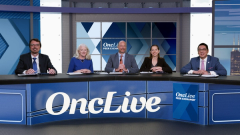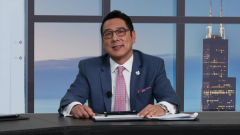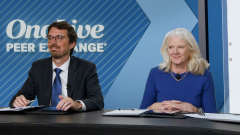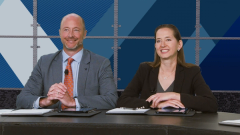
Establishing Eligibility for Frontline AR-Targeted Therapy in mHSPC
Continuing their discussion on frontline AR-targeted therapy in mHSPC, experts define how accessibility and patient eligibility impact treatment selection.
Episodes in this series

Transcript:
Evan Y. Yu, MD: When you look at the eligibility criteria for those studies, the PEACE1, it was de novo metastases and with error sense they end up with 86% of the patients with de novo disease, even though their criteria were loose. It was fit for docetaxel. How strict are you, and anyone else on the panel being with those criteria? I heard you say you're considering triplet therapy for high volume disease; would you do that for metachronous, somebody who had radical prostatectomy relapsed later. Would you consider triplet therapy for that patient or not? Or are you going to stick to what it looks like, the trial population?
Pedro C. Barata, MD, MSc: I can start at that. There's a number of factors. First of all, we don't have clear data to argue one way or the other. We can use data from all these trials that we're talking about, in this setting and make an educated guess. We know that patients who tend to do worse are the high volume, de novo metastatic, which is different from those who have also metastatic disease but happen to recur years later and they've finished treatment. That's one point that is relevant. The other point is to me is I tend to sequence all the patients up front. When I have an aggressive molecular profile, I makes me think about treatment intensification at that point. And 2, there's just some of the examples, but of course, if you have an aggressive variant, perhaps that you're going to think about those patients differently. We were chatting earlier today about what to do with PSAs [prostate specific antigens]. I also get nervous when I see a low PSA, it's not concurrent with the amount of disease that you see. All of those factors help me decide whether or not to push the envelope. Knowing that I have level 1 data, I think we are going to the next step and the next step will be breaking down all these subgroups of patients who present to us and understand that, perhaps, some of those might be well treated with ADT/NHT/ODT docetaxel while others would benefit from a triplet. While others, a few believe- but still- might be fine treated with ADT alone. But that's the vast minority, the last group that I mentioned.
Evan Y. Yu, MD: Others have thoughts on this? How much would you stretch the eligibility, or not stretch the eligibility?
Andrew J. Armstrong, MD, MSc: I agree with Pedro that most of these patients would benefit from a potent AR inhibitor except, perhaps, the liver metastases patients. We see hazard ratios close to one in all the AR therapy trials for that patient population. That's a definite docetaxel for me. For the metachronous patients, the case that's outside of the evidence, I would treat them like I would a high-volume patient, if they have a high volume disease and apply what we've learned from charted from ARASENS. That subgroup where the hazard ratio didn't seem to be very heterogeneous depending on whether its synchronous or metachronous, meaning relapsed or de novo.
Evan Y. Yu, MD: I was going to throw this out there because this is a tough question. We have 2 different studies here with 2 different agents, darolutamide and abiraterone. Let's say comorbidities aside. Let's say they're all equal and a patient's eligible for both. Is there a leaning one way or another in your patients?
Tanya B. Dorff, MD: They're both very well tolerated and they're both very powerful agents. To be honest, finances may end up being what drives practice patterns to some extent, especially, once you find out what the co-pay is when you submit that prescription you want to make sure your patient can afford their medication. I don't think there's a way to choose otherwise outside of what Mary-Ellen was talking about with the comorbidities.
Andrew J. Armstrong, MD, MSc: Paradoxically abiraterone is generic but it has some of the hardest co-pays because there's very little assistance programs for it, but it also has a food effect where the NCCN [National Comprehensive Cancer Network] guidelines actually recommend in-patients where resources are challenging and it may not otherwise be available that you can take one dose, one pill with food, a low-fat diet. That would be a 75% cost savings for that patient population. Many parts of the world could not afford many of the AR inhibitors that we're talking about. Darolutamide might be easier because of co-pay assistance. There's some concerns about COVID and the pandemic and the vaccine as well for prednisone use. A small dose of physiologic replacement prednisone would impair the vaccine efficacy, but we don't have a lot of great data there. It's just a concern that I hear voiced from some patients, the immune suppression.
Pedro C. Barata, MD, MSc: If I also may add; one thing that impacts what I choose in front line is the ability of enrolling clinical trial and we all think about it right? Prior therapies, yes or no so there's a few cases where when you have a study that is exploring 1 of these 2 molecules later on at time of progression and of course they might be 2 to 3 years away for instance, there's perhaps a patient where you're going to think as wisely as you can because you're thinking ahead. Being a marathon and not a sprint so the trials you have available not at that point in time but at point progression might also impact the sites that have those studies available and it's another option for you to consider or factor to consider.
Tanya B. Dorff, MD: Also, the fact that abiraterone requires more frequent blood monitoring at least for those first 3 months. I do think about that in patients who just are not going to be able to get back to the cancer center that frequently for that time period.
Andrew J. Armstrong, MD, MSc: It's very attractive for many urologists who are not comfortable with steroids or with high blood pressure monitoring and bone density monitoring, fracture, fall risks and some of the cardiovascular complications.
Evan Y. Yu, MD: I like this topic since it's new and the latest I'm going to stick with it for a little bit longer here and I'm going to ask another tough question. These trials were different designs. Do trial designs matter to you that much? At the end of the day we haven't talked much about enzamet and the combination of ADT enzalutamide docetaxel and the results were somewhat different than this but maybe trial design has an effect there as well, any of you have thoughts about the trial designs for these three different trials?
Andrew J. Armstrong, MD, MSc: Obviously the FDA cares about trial designs because they did not include enzamet in the FDA label for enzalutamide because of the fact that docetaxel was not pre-specified. It was kind of physicians to patient's choice as to who got it. It wasn't adequately controlled for in the analysis. You can see that some low volume patients got docetaxel, some high volume patients didn't get docetaxel and that could have confounded some of the results that we saw today in the abstract where it was kind of hard to tease out that true hazard ratio for the added benefits of that triple therapy in that study versus a pure design with PEACE-1 where everybody is getting docetaxel and then you're testing the added benefits of triple versus double therapy.
Tanya B. Dorff, MD: To me the big point about trial design is that none of the trails looked at plus or minus docetaxel in a pre-specified perspective way so that what we can conclude from them is that you need the AR targeted agent, but we can't yet tell the patient how much benefit they get from the triple being adding that docetaxel. We know from charted obviously in STAMPEDE that docetaxel is beneficial upfront, but I think that's the one missing piece when I'm counseling patients.
Andrew J. Armstrong, MD, MSc: Right the reverse design.
Tanya B. Dorff, MD: It comes down to picking the patient that needs docetaxel and then everyone gets AR targeted agent.
Evan Y. Yu, MD: Standing point now who's going to do that trial? I guess it's got to be through the NCTN mechanism, right? Yes it has to be, that's how it needs to be done.
Transcript edited for clarity.








































